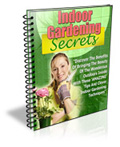Welcome to Gardening Guide
Vegetable Gardening Catalog Article
 . For a permanent link to this article, or to bookmark it for further reading, click here.
. For a permanent link to this article, or to bookmark it for further reading, click here.
Vegetable Gardening Catalog: Is This Okay?
from:For many, the vegetable gardening catalog will arrive fairly early in the growing season. Actually, it should come for you several months before the growing season starts! There are many companies that use catalogs to help them to distribute their gardening supplies throughout the area. In fact, it can be one of the best ways for you to get access to rare or heirloom quality products from various regions of the world. But, is it okay to purchase from vegetable gardening catalog choices? Should you do this or is this something that you would be better off doing locally?
Why The Catalog Works
In many areas of the country, gardeners are looking for something new, something challenging and even something special to grow. With the help of vegetable gardening catalog choices, they can get all of that and so much more. Many of the catalogs that are put out are actually put out by some of the best growers today. Since they canít have their establishments in every area due to climates and weather patterns, they would like to still offer their products and do so with the help of a catalog.
If you use a vegetable gardening catalog, you are likely to have more variety to select from in the plants that you choose to grow. Youíll find some of the best quality products, called heirloom vegetables, available to you. You can usually also find a number of different new vegetables to consider. Since science is always creating new and unique products including vegetables and varieties, it is always nice to have the ability to shop for these too. A vegetable gardening catalog can do just that for you.
When selecting a vegetable gardening catalog, though, you should take the time to really consider what you are buying and from who you are buying. Look for the reputation for the catalog by visiting websites that offer blogs and message boards. Youíll also find a number of different resources to help you to judge the quality of a company just by looking for a review of that company online. Purchasing from a high quality vegetable gardening catalog is very important to the success of your garden this year.
In fact, you donít even need to have the catalog delivered to your home in most cases. The fact is that there are plenty of ways that you can benefit from access that catalog right online! That will even save you time as well as money and youíll get all of the benefits of shopping with a vegetable gardening catalog.
Vegetable Gardening Catalog News



